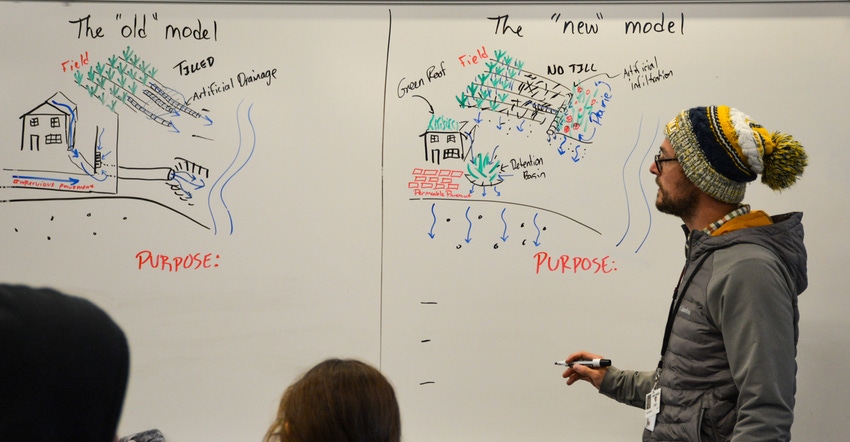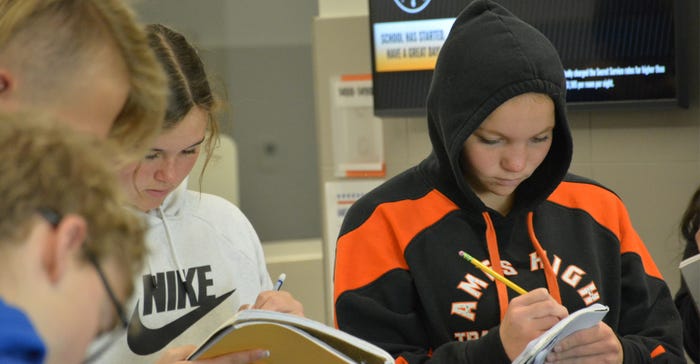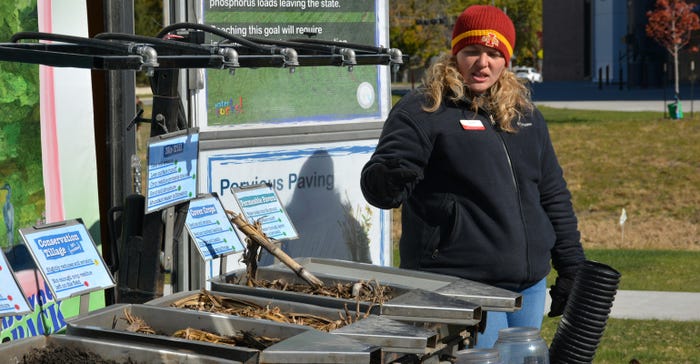November 15, 2022

Two science teachers at Ames High School in Ames, Iowa, have launched a new learning initiative focused on helping some 320 ninth- and 10th-grade students gain an appreciation for the water they use and depend on. Earth and space science teachers Collin Reichert and Kean Roberts found the roots of building a hands-on experiential learning opportunity for their students after attending a professional development workshop, “What’s in Your Watershed,” sponsored by Metro Waste Authority and the city of Clive, Iowa.
“We started talking about this during the Children and Nature Network Conference in May 2022,” Reichert said. “The initial thought was to get our students more connected with nature. It all came together in our minds during the watershed workshop in Clive. Water and watersheds are things that each student can relate to in their own way, and [they] offer ample topics for every student to find a personal connection to learn about.”
The “What’s in Your Watershed” unit is a multiweek program that incorporates learning about Iowa’s landscapes, water, watersheds and the challenges facing rural and urban communities. Included in the curriculum is independent research on a topic selected by the student. The unit also includes hands-on work in the field, conducting water testing, completing site surveys, and generally learning more about their environment.
“We want to avoid the doom-and-gloom approach to pollution, transitioning from studying the problems to determining what role we can play in making a difference,” Reichert said.

While most students in Ames live in an urban setting, the topics covered incorporate learning about point-source and nonpoint-source contributors to water pollution throughout the state. Tapping resources from organizations including Iowa PBS, Water Rocks, the city of Ames, Metro Waste Authority, Prairie Rivers of Iowa, Iowa State University and more, the teachers cast a wide net to give their students a rich range of ideas to stimulate interest.
“Our goal is for students to understand what’s happening in their watershed, deepen their connection to their local environment, and at the end of the day, to make recommendations that have a benefit to the community,” Roberts said. “Getting out of the classroom allows students to experience learning in their own way. And in ways that are relevant to their lives and history.”
Curriculum
The unit is tied to the state curriculum standards for science, which include a requirement for students to design an investigation into the properties of water. Students can self-select topics such as water quality, inventory of vegetation or wildlife, erosion or other ideas in which they have an interest.
“The students decide how they will approach the topic, conduct research, watch documentaries and/or work in the field,” Reichert said. “This independence is a new experience for most, but with some support and advising, we are seeing some great results.”
The capstone of the unit is a public exhibition of the research projects. The exhibition will also include public and private organizations, agencies and service providers who focus on water and the environment.

“We are excited to help the students share what they’ve learned, but also to build connections with community members and groups that are active in this area,” Roberts said. “The exhibition will bring together a lot of stakeholders to help the students see the broad scope of issues and solutions.”
The independence offered during the unit departs from the traditional classroom lecture setting. “This approach offers us a chance to place a strong focus on the learning process rather than the destination,” Roberts said.
Learning skills
Reichert also noted that the students are discovering and honing intrinsic soft skills such as time management, independent research and pursuing ideas beyond what is written in the textbook or presented in a lecture.
“A big part of this unit allows us to help the students gain confidence in their ability to research and rely on their own thought processes and knowledge to assess results,” Roberts said. “For example, when a student observes a water test showing no nitrate, rather than assuming they did something wrong, we encourage them to think through the ‘why.’ Sometimes an inconclusive result is still a learning opportunity.”
The curriculum includes several assessments which help the students see their progress on their strengths and weaknesses. “One of our goals with the independent project is to help our students learn about their skills and challenges,” Roberts said. “Not just for a grade, but more to reflect how they’ve progressed and built their skills, which will serve them in and outside the classroom.”
Both teachers are enthusiastic about the outcomes and are excited to share lessons learned and curriculum details with other teachers.
Ripley is the Iowa Learning Farms manager and a Water Rocks! conservation outreach specialist.
About the Author(s)
You May Also Like




